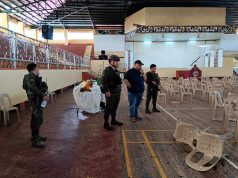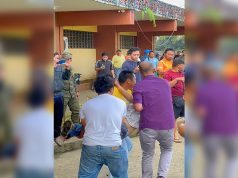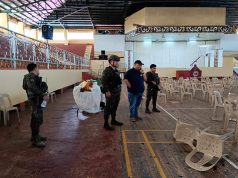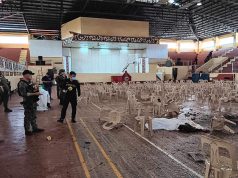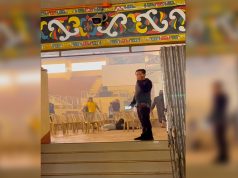MANILA – On Tuesday, July 4, the Supreme Court voted, with one dissent, to uphold the constitutionality of President Duterte’s 60-day martial law proclamation in Mindanao. Associate Justice Marvic Leonen cast that lone dissent.
Here’s how the SC Public Information Office summarized his dissenting opinion:
1. Justice Leonen dissents from the majority because his position is that the President cannot be granted “undefined powers over the entire Mindanao region” because his reading of the Constitution is that the Court should be “stricter, more precise, more vigilant of the fundamental rights of our people.” He pointed out that unlike previous versions of our Constitution, the 1987 Constitution provides for limitations for the declaration of martial law and “(t)herefore, any declaration must clearly articulate the powers that would be exercised by the President as Commander-in-Chief. It cannot now just be a declaration of a state of Martial Law. Otherwise, it would be unconstitutionally vague. It would not be possible to assess the sufficiency of the facts used as basis to determine ‘when public safety requries it’ (where) ‘it’ refers to the powers that are intended to be exercised by the President under Martial Law.”
2. He submits that Proclamation No. 216 issued on May 23, 2017 “expands with every new issuance from its administrators.”
a. General Order No. 1 issued by the President expands Martial Law by instructing the Armed Forces to “undertake all measures to prevent and suppress all acts of rebellion and lawless violence in the whole of Mindanao, including any and all acts in relation thereto, in connection therewith, or in furtherance thereof.” (emphasis in the original) Thus, Justice Leonen points out that under G.O. No. 1, “(a)ll acts of lawless violence throughout Mindanao even if unrelated to the ongoing hostilities in Marawi have been included…”
b. The second paragraph of Article 3 of G.O. No. 1 orders the AFP to cause the “arrest of persons and/or groups who have committed, are committing, or attempting to commit” both rebellion and any other kind of lawless violence.
c. The vagueness of Proclamation No. 216 hides its real intent. The Operational Directive for the Implementation of Martial Law issued by the Chief of Staff of the AFP orders his forces to “dismantle the NPA, other terror-linked private armed groups, illegal drug syndicates, peace spoilers, and other lawless armed groups.” (emphasis in the original) Arresting illegal drug syndicates and so-called “peace spoilers” under Martial Law unduly expands Proclamation No. 216. The factual basis for the declaration of martial law as presented do not cover these illegal acts as rationale for its proclamation. They are not acts falling within “rebellion” and cannot serve as justification for arrests but are made possible because of a vague and overly broad Proclamation.
d. Due to lack of guidance from Proclamation No. 216, the AFP as implementor of Martial Law defines it as the taking over of civilian government. Upholding Proclamation No. 216, without qualifications, allows the real possibility of military governors or installing the military as head of local, provincial, or regional government.
3. Justice Leonen also points out that the facts presented by the respondents were not sufficient ot reasonably conclude that the armed hostilities and lawless violence happening in Marawi City is “for the purpose of removing from the allegiance to said government or its laws, the territory of the Philippine Islands, or any part thereof, of any body of land, naval or other armed forces, depriving the Chief Executive or the Legislature, wholly or partially, of any of their powers or prerogatives.”
a. The armed hostilities in Marawi City are acts of terrorism done to prevent the actual service of warrants on leaders of local terrorist groups. They are not acts of rebellion.
b. Respondents, who bear the burden of proof, were unable to discharge the burden. Many of the facts presented were mere allegations; most were based on inference which were contradicted by the documents presented by the respondents themselves. The respondents did not even bother to either show their sources or present cogent analysis of intelligence information that led to their present level of confidence.
c. The facts presented by the parties themselves are not sufficient to justify the conclusion that Martial Law under Proclamation No. 216, General Order No. 1, and in the Operational Directives of the Chief of Staff of the AFP should be declared over the entire Mindanao. None of the directives specify which island or island groups belong to Mindanao.
4. He disagreed with the government’s position to elevate the acts of a lawless criminal group that uses terrorism as a tactic into the constitutional concept of rebellion because it acknowledges the lawless criminal group as a political group. Rebellion is a political crime and the Court has acknowledged that if rebels are able to capture government, then rebellion, no matter how brutal, will then be justified.
Acknowleding the Maute group as rebels elevates their “inhuman barbarism” into an “armed conflict of non-international character” protected by International Humanitarian Law.
5. Accordint to Justice Leonen, hostilities and lawless violence and their consequences can be addressed by many of the prerogatives of the President. There is no showing that Martial Law has become necessary for the safety of the entirety of Mindanao.
6. He ends his dissent with these words:
“History teaches us that to rely on the iron fist of an authoritarian backed up by the police and the military to solve our deep seated social problems that spawn terrorism is fallacy. The ghost of Marcos’ Martial Law lives within the words of our Constitution and rightly so. That ghost must be exorcised with passion by this Court whenever its resemblance reappears.
Never again should this court allow itself to step aside when the powerful invoke vague powers that feed on fear but could potentially undermine our most cherished rights. Never again should we fall victim to a false narrative that a vague declaration of martial law is good for us no matter the circumstances. We should have the courage to never again clothe authoritarianism in any disguise with the mantle of constitutionality.
The extremist views of religious fanatics will never take hold in our communities for so long as they enjoy the fundamental rights guaranteed by our constitution. There will be no radicals for so long as our government is open and tolerant of the activism of others who demand a more egalitarian, tolerant and socially just society.
We all need to fight the long war against terrorism. This needs patience, community participation, precision and a sophisticated strategy that respects rights while at the same time using force decisively at the right time and in the right way. The terrorist wins when we suspend all that we believe in. The terrorist wins when we replace social justice with disempowering authoritarianism.
We should temper our fears with reason. Otherwise, we succumb to the effects of the weapons of terror. We should dissent–even resist–when offered the farce that Martial Law is necessary because it is only an exclamation point.
For these reasons, I dissent.”
Below, full text of his opinion:




